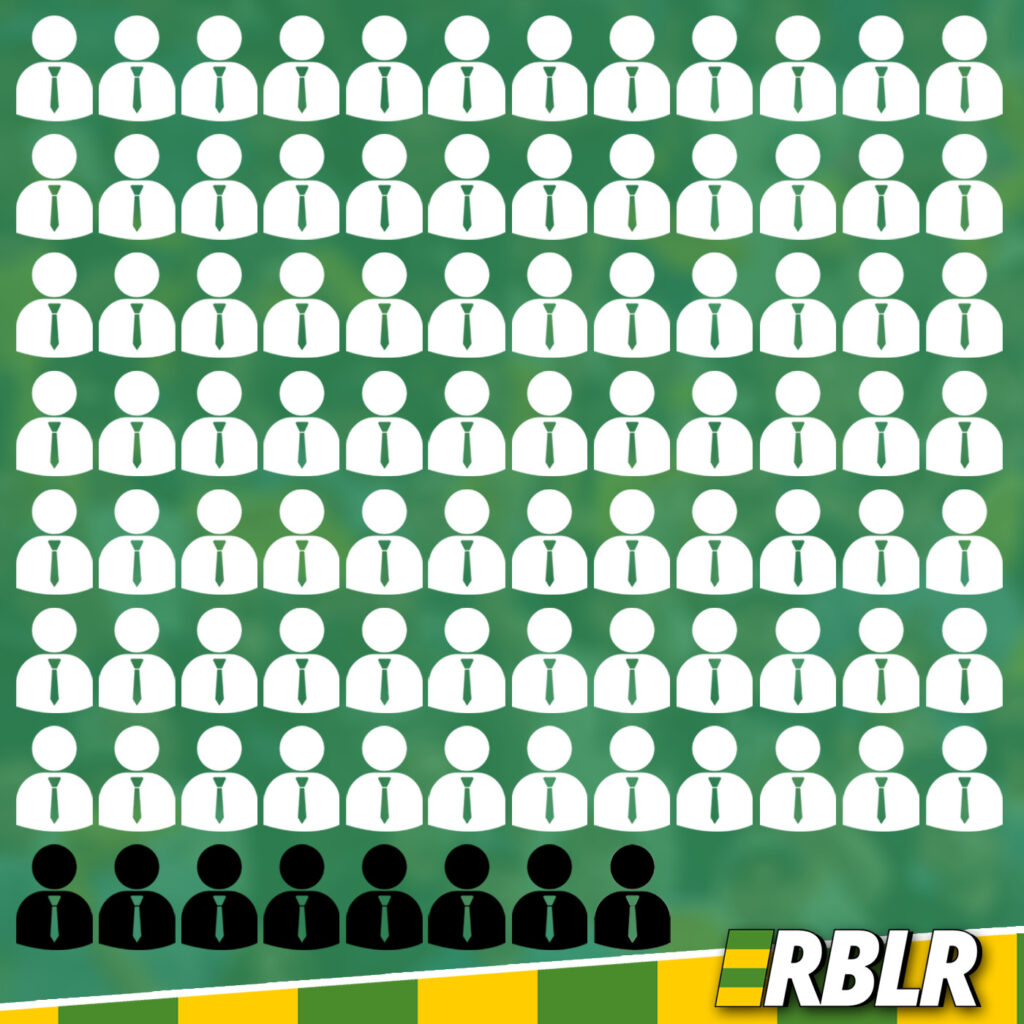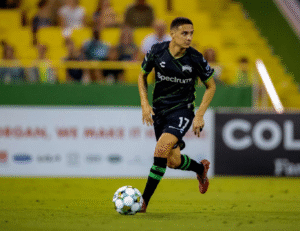The Scoreboard Doesn’t Lie: Changing The Lack of Diversity in Soccer Coaching

Opinion & Analysis by Dan Endonino
US Soccer has a problem.
Well, they have myriad problems. But the problem that sparked this commentary is one that seems to pop up once a year or so in an article and then disappears from the mainstream discussion until the following season. Lack of diversity in coaching and technical director roles is a chronic condition across professional soccer leagues. While we all wish that racial equity was a concept that organically existed, in the soccer world, like many spaces, white men tend to occupy more than 90 percent of coaching roles.
This is not a uniquely American problem; European soccer is inflicted with the same condition. If you were watching the Paramount Plus coverage of the Champions League, you may have heard Micah Richards, a Black former Manchester City player and current commentator, say he went into broadcasting instead of coaching due to the limited opportunities for former players that look like him.
The United States has the opportunity to lead the world to a more inclusive sport. Our soccer culture, from the stands to the boardrooms have a British addiction. Either consciously or subconsciously, we have tried to shape soccer in the US in the likeness of the sport across the pond. Unfortunately, there is a racial discrimination problem throughout European soccer of which anyone who has paid even slight attention to the Premier League, Champions League, or any other European League is aware.
This causes an anti-Black bias to be baked into the system which causes a systemic gatekeeping to Black and Brown coaches and technical directors to be hired.
Looking at the numbers, this only becomes more clear. According to an article published by Andscape in 2022, “of the 98 clubs that consist of the big five UEFA leagues (England’s Premier League, Spain’s LaLiga, Germany’s Bundesliga, Italy’s Serie A, France’s Ligue 1), only two had Black managers: Frenchmen Patrick Vieira of Crystal Palace and Antoine Kombouare of Nantes. Three of those five top leagues in the world feature no Black managers and have had years of this despite the number of Black players who play in LaLiga, the Bundesliga and Serie A.”
Unfortunately, the United States is not immune to this. Across our professional leagues, Black and Brown players dominate the pitch, yet, the numbers don’t translate to the representation in the managerial staff that we would hope to see.
There are 92 professional men’s teams between MLS, MLS Next Pro, USL Championship, and USL League One. MLS reports that Black players make up about 25% of currently rostered players. USL does not appear to have any data out there, but a preliminary count appears to be 20-25%.
Then we look at potential head coaching roles. Out of 92 potential head coach positions, there are only 8 Black head coaches. MLS currently has 29 teams and only has Wilfried Nancy of Columbus Crew and Robin Fraser of the Colorado Rapids as Black head coaches. MLS Next has 27 teams and has Clint Paey (New England Revolution II), Ibrahim Sekagya (NY Red Bulls II), Marlon LeBlanc (Philadelphia Union), Tyrone Marshall (FC Cincinnati), Jámison Olave (Real Monarchs), and Ricardo Clark (Whitecaps FC II).
Shockingly, USL Championship and USL League One currently have zero Black head coaches, despite a combined 36 teams.
It’s important to note that each of these leagues has teams joining within the next two years. Not only do we have the opportunity to hire Black coaches during the off season for existing teams as staff changes, but we have the responsibility to increase diversity with these brand new teams that don’t have the arguments of continuity or club culture to fall back on.
Not only are we not hiring Black coaches, their tenures tend to be shorter, and with an increasingly slim chance of being hired elsewhere. Out of fourteen Black former head coaches in the last 30 years across US Soccer only four have received future opportunities.
Meanwhile, the White coaching carousel spins freely.
This isn’t to call a club, a league, or the federation overtly racist. We just need to continue having conversations and pushing all of our soccer ecosystem to be better and to look inward at their implicit biases. It’s important that we, as fans and supporters, continue to call on our clubs to act in accordance with the slogans they push, like “Soccer is for Everyone.” While we all want this to be true, it’s hard to accept when the league we support every week, year after year, does not have a single Black head coach (looking at you, USL).
Recently, the Tampa Bay Rowdies found themselves with the need to hire a new head coach and potentially a new assistant coach after the departure of former head coach Neill Collins and assistant coach Jon Stead. Reportedly, this was a highly sought after position and potential coaches across the country were obviously interested.
This sparked much conversation amongst supporters who debated between a new leader, someone with extensive experience, and someone who knows the club culture. While some of us pushed for the chance to expand diversity in our league, a common defense from supporters was that we needed to hire someone who knew the culture, someone familiar with our club and structure so as to not shock the system.
We also saw the argument that we needed to hire someone who had experience so that we would steady the team, only then can we think about taking that next step toward diversity.
These lines of thinking are not without merit, but unfortunately, they create an ouroboros. We hire from a pool of experienced coaches who are mostly white men, because they are the ones who are given the opportunity to gain experience, or we hire from within our own structures, which again, tend to be white men, that we pluck from the starting lineup and shift to our coaching bench. Part of this is due to the overwhelming whiteness of club front offices, another portion is the lack of diversity down the bench, or down in the academy levels.
So how can we remove the tail of the white snake from its mouth? How can we ensure that the ouroboros of whiteness stops circling and diverse candidates are welcomed into the fray of potential coaches?
The policies of the National Football League may offer a starting point. The NFL, which also has a diversity problem, instituted what is called the Rooney Rule. It requires teams to interview at least one minority candidate for vacant coaching positions. Since its inception in 2003, the Rooney Rule has continued to be modified as per guidance from the Diversity and Inclusion committee of the NFL. Now, general managers, front office positions, coordinators, head coaches, and quarterback coaches are all positions that require interviews of at least two racial minority or women candidates.
There are some flaws within the Rooney Rule that allow some interview opportunities to slip through the cracks. The fact of the matter is, by instituting a formal procedure and policy for ensuring the increase of diversity, the league is showing its dedication to remedying a self-made problem.
A lack of diversity is not a natural occurrence but rather a choice, be it an active or subconscious choice. I believe US Soccer, or at the very least USL should look into adopting and improving on the NFL’s model for a system that would produce a stronger and more unified league through diversity and inclusion of Black coaches.
With the Rowdies short term hiring of Nicky Law, I have questions. Were any recently retired or close to retiring Black players approached? We learned recently from a comment by the broadcast team during the match against Tulsa FC that Law received a call out of the blue to pack up and come back to Tampa Bay. Why was Nicky Law the best option? This is not meant to be an attack on Coach Law as a person or a coach. In fact, I have only heard wonderful things about him. Rather, these questions stem from a lack of transparency.
For a position that was so highly sought after, why did we pull someone fresh off the pitch with no experience?
I firmly believe that transparency is desperately needed. And that needs to come from the clubs. With little to no independent media surrounding the league and its clubs, it is incumbent on the organizations to be open about hiring processes. It would increase the likelihood that Black and Brown candidates are being approached, and are being given the chance to prove themselves, rather than being written off in favor of someone whose hands we have shaken before.
I hope when the season is over, the front office commits to an extensive and transparent search of ALL coaches and not only the ones pushed by the major consultants and agents of the same old agencies, and the same carousel of white coaches we have always seen. I will gladly work with them to provide a list of qualified Black candidates that deserve a serious look.
While we have slogans like “Soccer is for everyone” and “Kick racism out of football” that make great hashtags and look great on merchandise, and while organizations like the United Black Players exist, the problem isn’t theirs alone to solve. Clearly, it’s easy for our clubs to hide behind these slogans without doing the work that shows that they believe the promises and principles the slogans are meant to convey.
It is up to us as fans, especially white fans, to stand up and add our voices, so this can no longer be ignored or glossed over with half measures that satiate us for a year, that give us an article to show that diversity is a problem, and then do nothing else.
Professional soccer goes beyond those on the pitch. We must continue to push for change in the offices and on the touch lines. Robert Kennedy, Sr. said, “This generation did not create most of the conditions and convictions which have led us to this day, but this generation has the responsibility to resolve them.”
We have seen the same cycle repeat itself year after year, coach after coach. We have the chance to shake up US Soccer, to make the coaching staff more closely represent the teams on the field. And while we didn’t create the lack of diversity from the start of US Soccer, we have the responsibility to change the future of it.
Editor’s Note: We are honored to give Dan a space to give his independent thoughts & start an important conversation, and promise to expand and reflect with other content such as podcasts & articles in the future.





